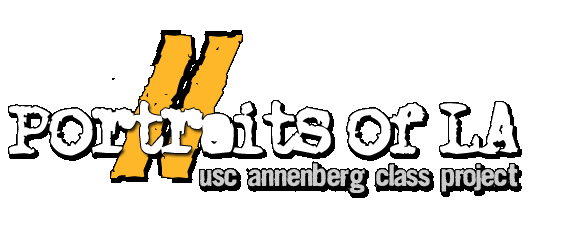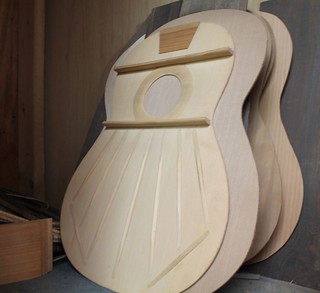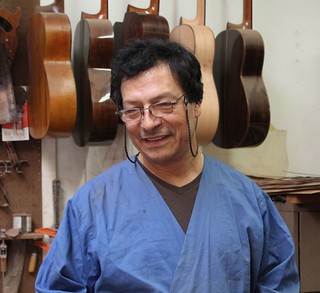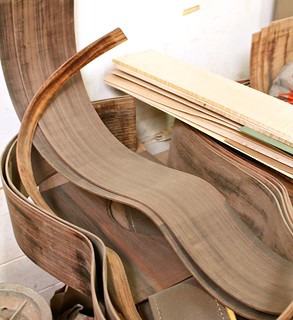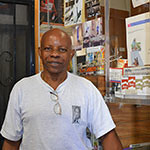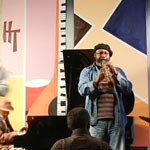The Devil's in the details
Armand Arnazzi, sales manager for luthier German Vazquez Rubio, talks about some of the details that really, really matter.
Healthy eating is harder to come by in South LA than in other parts of town, but that doesn't mean residentsaren't working for it. Katherine Davis talks to local grocers and activists about what it'll take to get more healthy food into the area.
Leimert Park has long been one of the cultural centers of black LA. This village within the city has held on to its eccentricities and its arts. Ashley Riegle points you to some of Leimert Park's riches.
Hollywood just doesn't feel like Hollywood any more. Although film permits and show pilots are up 18% since last quarter, California is still losing out to other states and countries that offer better tax incentives to productions. Michelle Bergmann takes a look at the numbers.
By Melissa Runnels
May 14, 2013
(Los Angeles) – It's not what you'd expect to find, poking around in South LA. Or anywhere in LA, for that matter. Tucked in to a series of brightly painted but disused-looking storefronts on West Adams, just around the corner from La Brea, is a small, nondescript business. You have to walk past it a couple of times before you notice that the sign in the window says “Flamenco Guitars”, with a note inviting you to come watch your guitar being made.
Inside, it's painted in dark tones, setting off the guitars and other stringed instruments hanging on the walls. A young man is telling the guy at the counter, “I really want to buy this guitar. Man, it's really beautiful. But I really, really want to move out from my dad's house. I can pay rent, or buy this guitar.”
His dilemma is understandable. The shop belongs to Germán Vazquez Rubio, a master guitar-maker from a family of Mexican high-end luthiers. In this little unassuming store, you can buy a hand-made flamenco or classical guitar (or bandurria, or quatro, or other stringed instrument played south of the United States), for around $5,000 at the low end. (Vazquez Rubio guitars have won awards for design and craftsmanship, and are played by such luminaries as John Williams.) You can have your instrument repaired, as well, and you can even learn to build your own guitar.
Stepping behind the counter to the workshop behind, the low-key vibe becomes more serious, as Vazquez Rubio and his assistants buckle down to the day's business: preparing a new guitar for its coats of varnish, shaping a neck, and gluing down a bridge (where the strings attach to the body of the instrument). It's quiet, the only sounds the persistent rasp of sandpaper on wood and the scraping of Vazquez Rubio's knife. Plus a radio quietly playing soft pop in the background. All eyes are on the tasks at hand.
Guitars live or die by millimeters of difference, said Armand Arnazzi, the store's sales manager (and himself a mean flamenco guitarist.) When asked what he thinks about when he's working, Vazquez Rubio said, he “wants [the instrument] to be the most perfect that it can be, the most clean. When I'm concentrating, I can't chat with these guys.” Arnazzi, who often translates from Vazquez Rubio's Spanish, underlined the precision needed. It's not conceptually hard to build a guitar, he says, it's all the little decisions that you have to make every step of the way.
“How much are you going to sand it just to start building? What's the thickness, you know? And are you going to bend the sides? Then you have to wet it. How much am I going to wet the wood? Am I going to wet it too much? Or not enough? And how long am I going to put it on the pipe [a heated pipe, to shape wood over] for? Is it going to burn? Or is it not going to bend enough? You know, they have a certain amount of time to bend it, you can't just keep heating it & heating it, or it'll burn. I mean, it's just every single little step in making it is something that could go wrong, so you have to have your proper training & know what you're doing.”
Vazquez Rubio learned his skill and art the old-fashioned way. He's from a small city called Pachaco, in Michoacán, Mexico, that has specialized in making guitars for over 200 years. A documentary about the town claims that 15 factories there produced over 2000 guitars a day before NAFTA and other free-trade agreements.
Within that mass-market production, there exists an artisanal tradition of hand-crafted guitars. Vazquez Rubio's family are among those who practice the tradition. He quit school when he was 11 to learn the trade from his uncle. His nephew, Juan, works in the West Adams shop after having learned from his own father. It took two years of almost daily practice, Juan said, before he felt competent at applying lacquer.
Pachaco luthiers take a distinctly hands-on approach to instrument-making. When they shape the curvy sides of a guitar, they don't use the usual steam-molds. They wire up a metal pipe, plug it in, & bend the thin wood panels by hand over the pipes. Vazquez Rubio's version controls heat by means of a dimmer switch like the ones you might adjust your living-room lights with.
Vazquez Rubio's preferred all-around tool is a hand-made knife, which he uses for shaping, scraping, and cutting. This, too, is very Pachacan. The tool came with him when he travelled to Los Angeles in the seventies to study with a Hollywood luthier.
There's a steady market on eBay for his work, as Vazquez Rubio's guitars are known for their “even tone, depth, clarity, sweetness, and volume.” If you scan guitar-geek blogs online, the word “playable” comes up frequently, meaning that the guitars feel good under your fingers. Some of this is due to Vazquez Rubio's signatures. A luthier's signature is in his choice of woods, his plantillas (patterns, shapes), and his bracing – the strips of wood glued to the inside surfaces of a guitar to provide structural support and tonal quality.
Arnazzi says Vazquez Rubio hasn't patented his designs, which is not unusual. “It's so hard to make a guitar that there's really no need. Because even if someone were to steal the pattern, to make the guitar sound and feel like somebody else['s] – generally speaking, nobody cares. It's like, feel free to try and make one.”
That combination of assurance, skill, and focus on the work has kept Vazquez Rubio in business, and kept guitarists struggling to come up with good reasons to buy a new instrument, rather than pay the rent. (Arnazzi said that some of his customers bring old cases to hide their new, pricey instruments from spouses.) In a city known for trendiness and suburban sprawl, it's reassuring to know that Los Angeles also makes room for the value of craftsmanship and skill.

